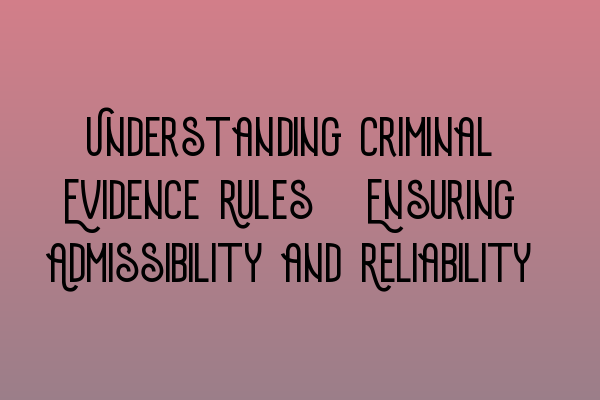Understanding Criminal Evidence Rules: Ensuring Admissibility and Reliability
In the field of criminal law, evidence plays a vital role in determining the guilt or innocence of an individual. It serves as the foundation for the legal process which is aimed at ensuring justice is served. Understanding the rules surrounding criminal evidence is crucial for legal professionals to effectively represent their clients and navigate the complexities of the legal system.
The Importance of Admissibility
One of the key considerations when examining criminal evidence is its admissibility in court. Admissibility refers to whether the evidence can be presented and considered by the judge or jury during the trial. The rules surrounding admissibility aim to ensure the fairness and reliability of the evidence presented.
To determine admissibility, various factors are taken into account, such as relevance, reliability, and the manner in which the evidence was obtained. It is important for legal professionals to have a thorough understanding of these rules to ensure that only admissible evidence is presented to the court.
Ensuring Reliability
Reliability is a crucial aspect of criminal evidence. The court must be able to rely on the accuracy and authenticity of the evidence presented. This ensures that justice is served and prevents false or misleading information from influencing the outcome of a case.
There are several factors that contribute to the reliability of evidence. These include the credibility of witnesses, the chain of custody of physical evidence, the use of expert testimony, and the scientific validity of any forensic techniques used. Legal professionals must carefully analyze the reliability of the evidence and be prepared to challenge its credibility when necessary.
Understanding the Rules
Legal professionals can enhance their understanding of the rules surrounding criminal evidence through comprehensive preparation and continued education. By enrolling in SQE 1 Preparation Courses and SQE 2 Preparation Courses, individuals can gain the necessary knowledge and skills to navigate the complexities of evidence rules in criminal law.
These courses provide a comprehensive overview of the rules of evidence, including the admissibility requirements, reliability factors, and relevant case law. They also offer practical exercises and mock exams to assess and strengthen the understanding of these rules.
Further Resources
If you’re interested in further enhancing your knowledge of criminal evidence rules, we recommend exploring the following related articles:
